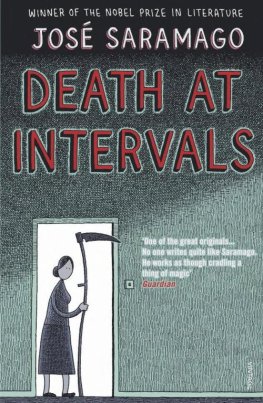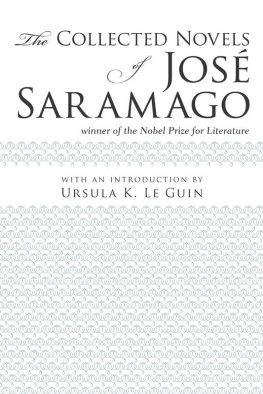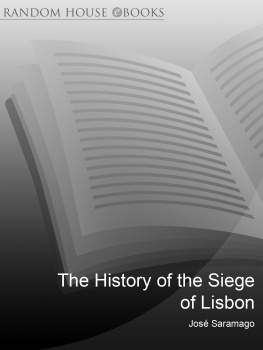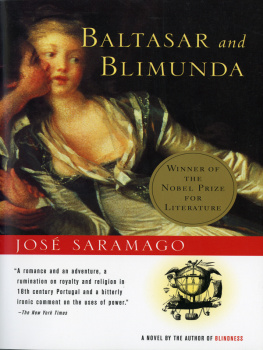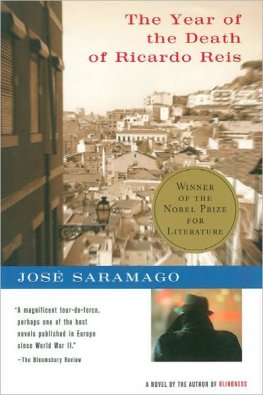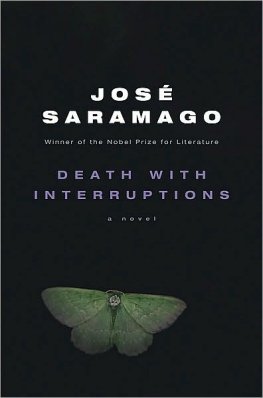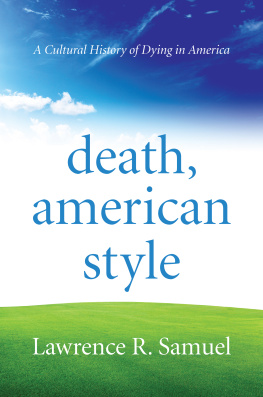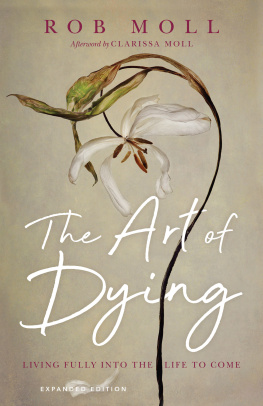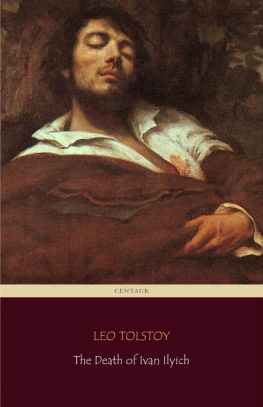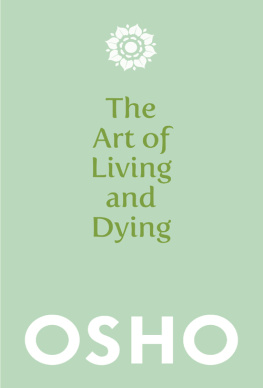Jos Saramago
DEATH AT INTERVALS
We will know less and less what it means to be human.
Book of Predictions
If, for example, you were to think more deeply about death, then it would be truly strange if, in so doing, you did not encounter new images, new linguistic fields.
Wittgenstein

THE FOLLOWING DAY, no one died. This fact, being absolutely contrary to lifes rules, provoked enormous and, in the circumstances, perfectly justifiable anxiety in peoples minds, for we have only to consider that in the entire forty volumes of universal history there is no mention, not even one exemplary case, of such a phenomenon ever having occurred, for a whole day to go by, with its generous allowance of twenty-four hours, diurnal and nocturnal, matutinal and vespertine, without one death from an illness, a fatal fall, or a successful suicide, not one, not a single one. Not even from a car accident, so frequent on festive occasions, when blithe irresponsibility and an excess of alcohol jockey for position on the roads to decide who will reach death first. New years eve had failed to leave behind it the usual calamitous trail of fatalities, as if old atropos with her great bared teeth had decided to put aside her shears for a day. There was, however, no shortage of blood. Bewildered, confused, distraught, struggling to control their feelings of nausea, the firemen extracted from the mangled remains wretched human bodies that, according to the mathematical logic of the collisions, should have been well and truly dead, but which, despite the seriousness of the injuries and lesions suffered, remained alive and were carried off to hospital, accompanied by the shrill sound of the ambulance sirens. None of these people would die along the way and all would disprove the most pessimistic of medical prognoses, Theres nothing to be done for the poor man, its not even worth operating, a complete waste of time, said the surgeon to the nurse as she was adjusting his mask. And the day before, there would probably have been no salvation for this particular patient, but one thing was clear, today, the victim refused to die. And what was happening here was happening throughout the country. Up until the very dot of midnight on the last day of the year there were people who died in full compliance with the rules, both those relating to the nub of the matter, i.e. the termination of life, and those relating to the many ways in which the aforementioned nub, with varying degrees of pomp and solemnity, chooses to mark the fatal moment. One particularly interesting case, interesting because of the person involved, was that of the very ancient and venerable queen mother. At one minute to midnight on the thirty-first of december, no one would have been so ingenuous as to bet a spent match on the life of the royal lady. With all hope lost, with the doctors helpless in the face of the implacable medical evidence, the royal family, hierarchically arranged around the bed, waited with resignation for the matriarchs last breath, perhaps a few words, a final edifying comment regarding the moral education of the beloved princes, her grandsons, perhaps a beautiful, well-turned phrase addressed to the ever ungrateful memory of future subjects. And then, as if time had stopped, nothing happened. The queen mother neither improved nor deteriorated, she remained there in suspension, her frail body hovering on the very edge of life, threatening at any moment to tip over onto the other side, yet bound to this side by a tenuous thread to which, out of some strange caprice, death, because it could only have been death, continued to keep hold. We had passed over to the next day, and on that day, as we said at the beginning of this tale, no one would die.
It was already late afternoon when the rumour began to spread that, since the beginning of the new year, or more precisely since zero hours on this first day of january, there was no record in the whole country of anyone dying. You might think, for example, that the rumour had its origins in the queen mothers surprising resistance to giving up the little life that was left to her, but the truth is that the usual medical bulletin issued to the media by the palaces press office not only stated that the general state of the royal patient had shown visible signs of improvement during the night, it even suggested, indeed implied, choosing its words very carefully, that there was a chance that her royal highness might be restored to full health. In its initial form, the rumour might also have sprung, naturally enough, from an undertakers, No one seems to want to die on this first day of the new year, or from a hospital, That fellow in bed twenty-seven cant seem to make up his mind one way or the other, or from a spokesman for the traffic police, Its really odd, you know, despite all the accidents on the road, there hasnt been a single death we can hold up as a warning to others. The rumour, whose original source was never discovered, although, of course, this hardly mattered in the light of what came afterwards, soon reached the newspapers, the radio and the television, and immediately caused the ears of directors, assistant directors and editors-in-chief to prick up, for these are people not only primed to sniff out from afar the major events of world history, theyre also trained in the ability, when it suits, to make those events seem even more major than they really are. In a matter of minutes, dozens of investigative journalists were out on the street asking questions of any joe soap who happened by, while the ranks of telephones in the throbbing editorial offices stirred and trembled in an identical investigatory frenzy. Calls were made to hospitals, to the red cross, to the morgue, to funeral directors, to the police, yes, all of them, with the understandable exception of the secret branch, but the replies given could be summed up in the same laconic words, There have been no deaths. A young female television reporter had more luck when she interviewed a passer-by, who kept glancing alternately at her and at the camera, and who described his personal experience, which was identical to what had happened to the queen mother, The church clock was striking midnight, he said, when, just before the last stroke, my grandfather, who seemed on the very point of expiring, suddenly opened his eyes as if hed changed his mind about the step he was about to take, and didnt die. The reporter was so excited by what shed heard that, ignoring all his pleas and protests, No, senhora, I cant, I have to go to the chemists, my grandfathers waiting for his prescription, she bundled him into the news car, Come with me, your grandfather doesnt need prescriptions any more, she yelled, and ordered the driver to go straight to the television studio, where, at that precise moment, everything was being set up for a debate between three experts on paranormal phenomena, namely, two highly regarded wizards and a celebrated clairvoyant, hastily summoned to analyse and give their views on what certain wags, the kind who have no respect for anything, were already beginning to refer to as a death strike. The bold reporter was, however, labouring under the gravest of illusions, for she had interpreted the words of her interviewee as meaning that the dying man had, quite literally, changed his mind about the step he was about to take, namely, to die, cash in his chips, kick the bucket, and so had decided to turn back. Now, the words that the happy grandson had pronounced, As if hed changed his mind, were radically different from a blunt, He changed his mind. An elementary knowledge of syntax and a greater familiarity with the elastic subtleties of tenses would have avoided this blunder, as well as the subsequent dressing-down that the poor girl, scarlet with shame and humiliation, received from her immediate superior. Little could they, either he or she, have imagined that these words, repeated live by the interviewee and heard again in recorded form on that evenings news bulletin, would be interpreted in exactly the same mistaken way by millions of people, and that an immediate and disconcerting consequence of this would be the creation of a group firmly convinced that with the simple application of will power they, too, could conquer death and that the undeserved disappearance of so many people in the past could be put down solely to a deplorable weakness of will on the part of previous generations. But things would not stop there. People, without having to make any perceptible effort, continued not to die, and so another popular mass movement, endowed with a more ambitious vision of the future, would declare that humanitys greatest dream since the beginning of time, the happy enjoyment of eternal life here on earth, had become a gift within the grasp of everyone, like the sun that rises every day and the air that we breathe. Although the two movements were both competing, so to speak, for the same electorate, there was one point on which they were able to agree, and that was on the nomination as honorary president, given his eminent status as pioneer, of the courageous veteran who, at the final moment, had defied and defeated death. As far as anyone knows, no particular importance would be given to the fact that grandpa remains in a state of profound coma, which everything seems to indicate is irreversible.

